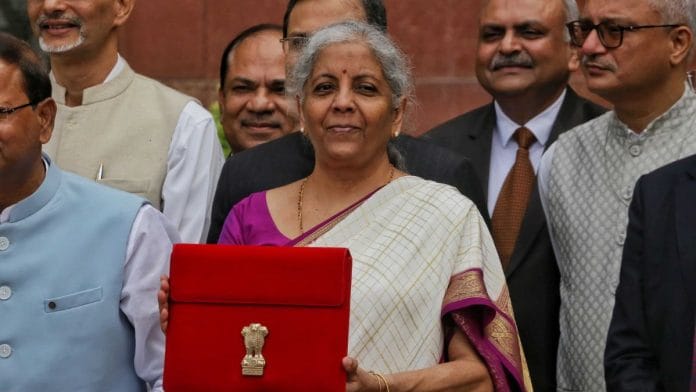Budget 2024 marks a pivotal moment in India’s fiscal policy history. Backed by a third mandate, the Narendra Modi government seeks to augment the promises of a ‘Viksit Bharat’ made in the interim budget. A profound sense of addressing inequities and designing a fabric for all-round social justice is high on the government’s agenda. Finance Minister Nirmala Sitharaman focussed on the imperatives for the government in the next decade, as India sets out on a path of fiscal consolidation and societal exceptionalism.
In this context, India’s economic growth remains a notable bright spot, and if robust tax collections are any indication, it will only grow exponentially in the next decade. Additionally, India’s inflation continues to be low, stable, and moving towards the 4 percent target. Core inflation (non-food, non-fuel) currently is 3.1 percent. Steps are being taken to ensure adequate supplies of perishable goods reach the market. The budget does not veer towards populism and continues to carve a pathway for fiscal consolidation by maintaining the 4.9 percent target.
Budget 2024 lays out several key blueprints with nuanced implications for both citizenry and industry at large.
Also read: Modi govt’s Budget 2024 plays unabashed appeasement politics—after borrowing Congress ideas
Roadmap towards sustainable growth
Budget 2024 heralds a transformative regime for environmental incandescence through various green energy initiatives linked to overall enhancement. As a numero uno measure, the finance ministry intends to develop a taxonomy for climate finance, which would in turn enhance the availability of capital for climate adaptation and mitigation.
The finance minister has laid down nine priorities for this budget, with the first primarily focused on agricultural commitments. Natural farming has been added, wherein various institutions will be dedicated to enhancing farmer education, leading to a decrease in environment degradation.
Coupled with the pressing need to tackle energy transition, the PM Surya Ghar Muft Bijli Yojana was introduced to install rooftop solar plants for various households. This priority also states allocations for nuclear energy along with the development of thermal power plants. Through these proposals, the government has solidified its claims for sustainable development, green energy initiatives, and eco-friendly growth.
As a secondary measure, the basic customs duty (BCD) on PVC flex banners, which are non-biodegradable and hazardous, has been raised from 10 to 25 percent. Substantive policy guidance will streamline India’s commitment to the Paris Agreement and serve as a clarion call for a true-green economy.
Strategic advancement of infrastructure
The Budget focusses extensively on infrastructure development with special emphasis on promoting projects in backward areas. It aims to spend 3.4 percent of GDP on capital expenditure, continuing a trend set in 2023. A dedicated industrial corridor has been announced to foster economic growth in non-industrialised parts of the nation. Reduction in stamp duty, a state subject, will significantly reduce the cost of acquisition and promote low-cost housing.
Further, the budget addresses concerns of housing for all under the PM Awaas Yojana. Budget proposals for a tax rate of 12.5 percent for long-term capital gains (LTCG) on all forms of financial and non-financial assets by eliminating indexation is a step towards a fair and equitable system. Removal of indexation for long-term gains and parity in taxation between residents and non-residents further reinforce fairness principles. While the proposals streamline rates, the tax burden on market investors will increase, particularly given the securities transaction tax on derivative transactions.
Also read: Budget has complex political message. It shows BJP ko BASE pasand hai
Bolstering ‘ease of doing business’
Budget 2024 has affirmed the project of a comprehensive review of the Income Tax Act, 1961, within the next six months, thereby solidifying the belief about the enactment of a new direct tax code. The proposals further aim to reduce tax litigation by increasing the threshold to file appeals before various forums and reducing time limits for initiation of reassessment proceedings. The announcement of the ‘Vivad se Vishwas’ scheme 2024 will provide a fresh opportunity for taxpayers who, in the absence of the settlement commission, had no options but to litigate.
The announcement to increase the benches of the National Company Law Tribunal (NCLT) and Debt Recovery Tribunals, augmented with recent appointments of members, will lead to a reduction in case pendency and a smoother debt resolution process. The budget has taken giant strides to merge technological advancements with the Insolvency and Bankruptcy Code, 2016 to accelerate recovery procedures.
Renewed emphasis on human development
The budget proposals identify specified groups and mobilise them to contribute to the continuation of the “Viksit Bharat” story. It envisages assimilation of the new workforce by providing subsidies and benefits for employees and employers. To promote employability, the budget makes provision for internships in top 500 companies with compulsory stipends for youth, allocating 10 percent of internship costs from CSR funds. It also addresses agrarian distress with budgetary allocations to strengthen the farmer base and boost agriculture productivity.
The budget proposals demonstrate an intent to promote entrepreneurship. Further, to supplement these proposals, the government has also opened up schemes wherein young professionals would be eligible to receive a monthly allowance of Rs 5,000, thereby promoting start-up culture and boosting employment. It is a noble move aimed at fostering a spirit of entrepreneurship and vitality among the world’s largest youth base. Substantial tax incentives and a holistic package to promote this endeavour are extremely positive considerations.
Budget 2024 proposals have paved the way for economically prosperous and sustainable growth. This budget has also proposed changes within the ambit of direct taxes and indirect taxes and has set agendas for next-generation reforms. The policies are formulated in a manner that would achieve growth targets, guaranteeing development in a holistic manner.
Mukesh Butani is Managing Partner, BMR Legal Advocates. He tweets @mukeshbutani. Views are personal.
— With inputs from Siddharth Agrawal and Pratha Khanna, Associates at BMR Legal Advocates.






